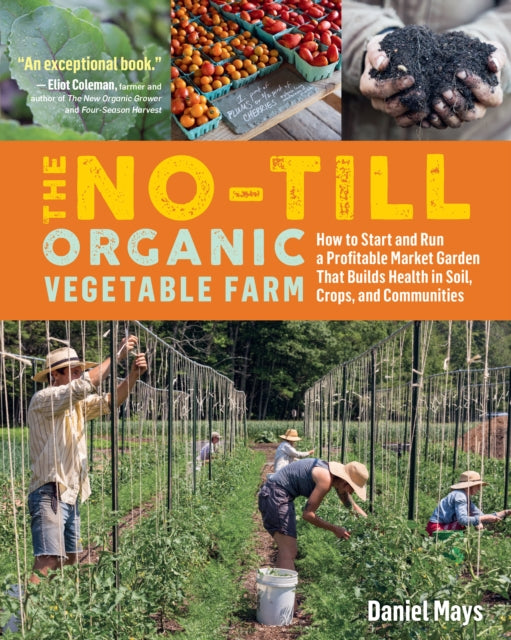Daniel Mays
No-Till Organic Vegetable Farm: How to Start and Run a Profitable Market Garden and Build Health in Soil, Crops and Communities
No-Till Organic Vegetable Farm: How to Start and Run a Profitable Market Garden and Build Health in Soil, Crops and Communities
YOU SAVE £5.72
- Condition: Brand new
- UK Delivery times: Usually arrives within 2 - 3 working days
- UK Shipping: Fee starts at £2.39. Subject to product weight & dimension
Bulk ordering. Want 15 or more copies? Get a personalised quote and bigger discounts. Learn more about bulk orders.
Couldn't load pickup availability
- More about No-Till Organic Vegetable Farm: How to Start and Run a Profitable Market Garden and Build Health in Soil, Crops and Communities
No-till farming is a sustainable farming method that offers environmental, social, and economic benefits. This guide provides aspiring and beginning farmers with streamlined planning and record-keeping tools, marketing strategies, and community engagement programs.
\n Format: Paperback / softback
\n Length: 240 pages
\n Publication date: 01 December 2020
\n Publisher: Storey Publishing LLC
\n
No-till farming is a revolutionary approach to crop cultivation and pasture management that has gained significant popularity as an alternative to conventional farming practices. In this comprehensive guide, author Daniel Mays, a seasoned organic no-till farmer from Maine, delves into the myriad environmental, social, and economic advantages of this system. Mays emphasizes that the methods outlined in this book are tailored for implementation at the human scale, relying primarily on human power and minimal use of machinery.
The book offers streamlined planning and record-keeping tools, as well as marketing strategies, to assist aspiring and beginning farmers in successfully transitioning to no-till farming. It also highlights community engagement programs such as CSA (Community Supported Agriculture), food justice initiatives, and on-farm education, which foster a sense of connection and collaboration among farmers and their communities.
One of the key benefits of no-till farming is its ability to enhance soil health and fertility. By minimizing soil disturbance, the soil structure is preserved, allowing for better water infiltration, retention, and nutrient cycling. This, in turn, leads to increased soil organic matter content, improved soil structure, and reduced erosion. Moreover, no-till farming promotes the growth of beneficial soil microorganisms, such as bacteria and fungi, which play a crucial role in nutrient digestion, decomposition of organic matter, and pest control.
Another advantage of no-till farming is its positive impact on water conservation. By reducing the amount of tillage required, water usage is minimized, as the soil is not exposed to the elements and moisture is retained within the soil profile. This not only reduces water pollution but also helps to mitigate the effects of climate change by reducing greenhouse gas emissions associated with agricultural practices.
In addition to its environmental benefits, no-till farming also offers social and economic advantages. By promoting soil health and fertility, no-till farming can increase crop yields and reduce the need for chemical inputs, resulting in lower production costs and increased profitability for farmers. Moreover, the reduced erosion and improved water quality associated with no-till farming can enhance ecosystem services, such as water filtration and carbon sequestration, providing additional benefits to society.
However, implementing no-till farming requires careful planning and consideration. Farmers need to have a solid understanding of their soil conditions, crop preferences, and market demands to develop effective management strategies. They also need to invest in appropriate equipment and technology, such as precision planting systems and cover crops, to ensure efficient and sustainable farming practices.
Community engagement is another critical aspect of no-till farming. By working closely with their communities, farmers can build relationships, educate consumers about sustainable agriculture, and promote the adoption of no-till farming practices. This not only benefits the farmers but also contributes to the broader sustainability movement, promoting a more ecologically and socially responsible food system.
In conclusion, no-till farming is a transformative approach to crop cultivation and pasture management that offers numerous environmental, social, and economic benefits. By implementing the methods outlined in this comprehensive guide, aspiring and beginning farmers can transition to no-till farming and contribute to the sustainability of our food system. However, it is important to approach no-till farming with careful planning, consideration, and a commitment to sustainable practices to ensure its long-term success.
\n Weight: 734g\n
Dimension: 203 x 252 x 16 (mm)\n
ISBN-13: 9781635861891\n \n
This item can be found in:
UK and International shipping information
UK and International shipping information
UK Delivery and returns information:
- Delivery within 2 - 3 days when ordering in the UK.
- Shipping fee for UK customers from £2.39. Fully tracked shipping service available.
- Returns policy: Return within 30 days of receipt for full refund.
International deliveries:
Shulph Ink now ships to Australia, Belgium, Canada, France, Germany, Ireland, Italy, India, Luxembourg Saudi Arabia, Singapore, Spain, Netherlands, New Zealand, United Arab Emirates, United States of America.
- Delivery times: within 5 - 10 days for international orders.
- Shipping fee: charges vary for overseas orders. Only tracked services are available for most international orders. Some countries have untracked shipping options.
- Customs charges: If ordering to addresses outside the United Kingdom, you may or may not incur additional customs and duties fees during local delivery.


